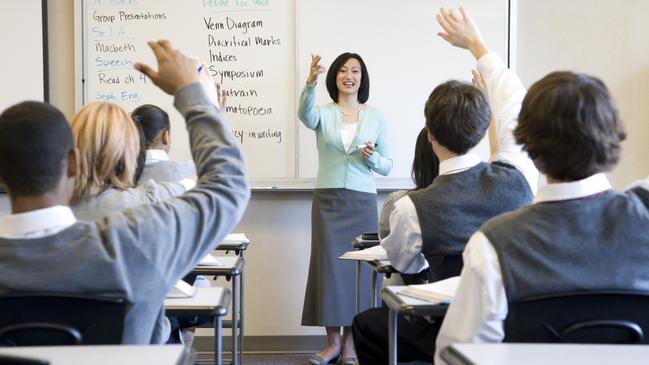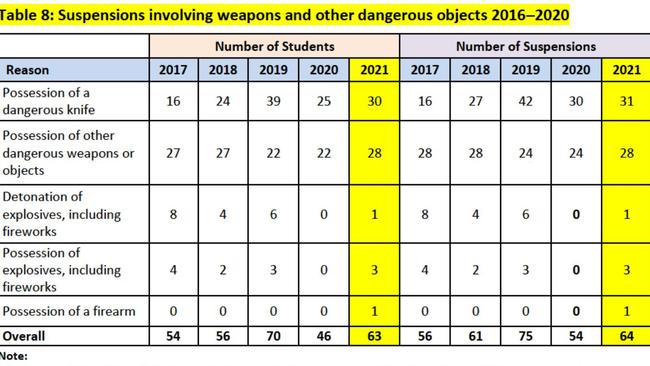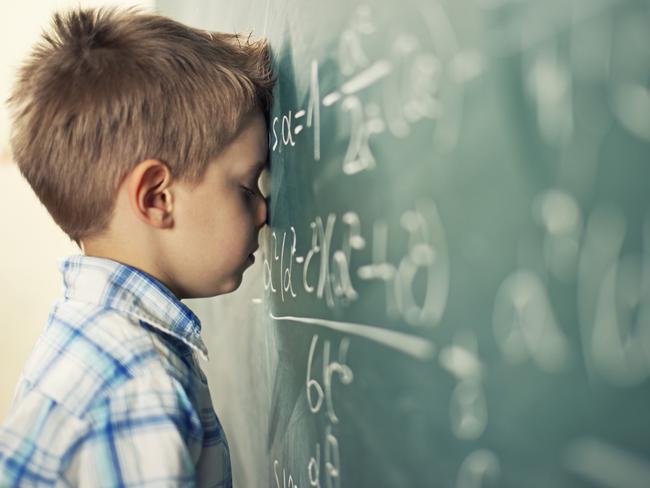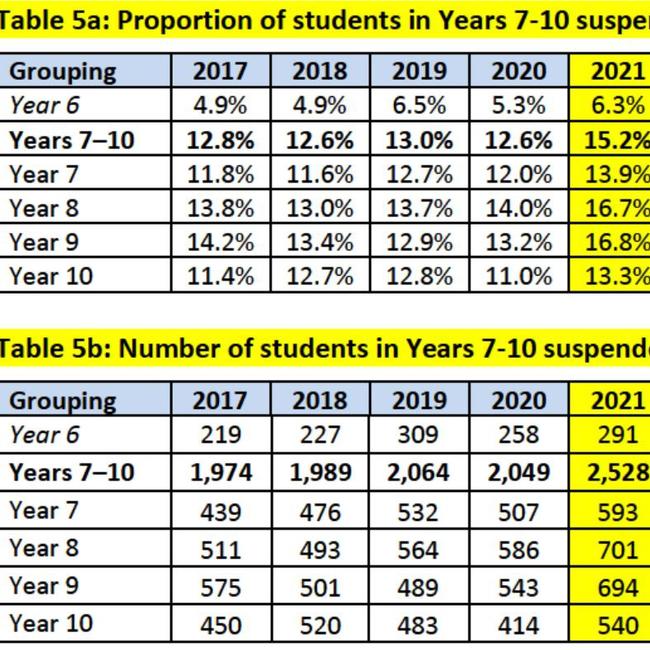Suspensions and violence on rise: Tasmania’s falling school performance revealed
A third of Tassie kindy kids are failing major developmental markers -- like fine motor skills, speaking and understanding -- as a new report reveals what the Department needs to do to improve their report card. See the full report.
News
Don't miss out on the headlines from News. Followed categories will be added to My News.
Tassie teachers are reportedly quitting in droves as it’s revealed suspensions are at a record high and incidents are becoming more violent — with one student even bringing a firearm to school.
Figures obtained by Right to Information show that 2021 had the highest number of suspensions ever recorded under the Tasmanian Education Act.
It reveals teachers are copping physical abuse, harassment and stalking behaviour from students at a rapidly rising rate.
In the four years from 2017 to 2021 there was a 43 per cent increase in students being suspended for physical abuse or harassment of a teacher.
There were 244 students suspended for physical abuse or harassment last year, with another 30 suspended for stalking or harassment.
Previous figures showed that throughout that four-year period the Department of Education saw a 61 per cent increase in stress-related workers compensation claims.
Australian Education Union Tasmanian president David Genford said teachers and staff were “burnt out” and quitting the education system in droves.
“For 14 months educators have been calling for much needed education reform, yet all the State Government has done is sat back and watched as teachers and support staff burnt out working tirelessly through a pandemic,” he said.
“Record numbers left the profession last year over untenable working conditions and teachers are now reporting more than ever that they are considering resigning unless real change occurs.”
In Tasmanian schools there is the equivalent of one psychologist for every 900 students and one social worker for every 800 students.

Tasmanian Association of State School Organisations president Nathan Reynolds said he was concerned at recent violent incidents in two schools.
“One parent has since taken their child out of that school and it shows we need more teacher assistants and smaller classes which would help with behavioural issues,” he said.
“There is no place in schools for that sort of behaviour.”
Australian Education Union president David Genford said a lack of support staff in schools meant students were not getting the help they needed to manage their behaviour.
“It is hard for teachers who have to deal with students taking weapons to school and sometimes they are threatened by students from other schools.
“We’ve also had incidents of students biting and hitting teachers.”
The Education Department said “positive and respectful behaviour” encouraged learning.
“Violence or harassment of staff or students any kind is not tolerated in Tasmanian schools.
“Principals exercise their professional judgment when managing student behaviour, within a clear legislative and policy framework.”
Weapons in schools
A student was suspended for bringing a firearm into school in 2021, the first suspension of its kind since current records began.
The newly formed Department for Education, Children and Young People did not confirm which school was involved nor the grade of the student.
However, a spokesperson confirmed this was the first firearm-related suspension for this recording period.

“There was one suspension in the ‘possession of a firearm’ category in 2021 and none in the preceding 4 years,” a department spokesperson said.
The report shows in 2021, 30 students were suspended for bringing a knife to school, 28 for “other dangerous weapons”, and three for bringing explosives or fireworks.
That year 2739 students were suspended for behaviour that threatened the “health, safety, or welfare” of others, and 195 for actions likely to cause injury to people or property.
The former category has increased by 46 per cent in four years, while the latter increased by 16 per cent.
Since they were first recorded in 2018, the number of harassment and stalking related suspensions has increased by 229 per cent.
Suspensions on the rise
More than 15 per cent of all high school students were suspended between 2017 to 2021, compared with just two per cent of college-age students.
In the first term of 2022 alone, there were 1416 high school suspensions, 404 primary school suspensions, and 62 suspensions for Years 11 and 12.
The Right to Information report was obtained by Labor MLC Josh Willie, who said these figures were an indictment on Tasmania’s education system.
He said Tasmania’s recent teacher strikes spoke to a workforce that was under-resourced to handle the needs of students.
”Students who are engaged in meaningful learning aren’t assaulting each other and lashing out at teachers; it’s quite clear there’s more support required in schools,” Mr Willie said.
“These issues have been raised for many, many years, the government has failed to respond, and now we have record high suspension rates.”
The report notes that efforts were underway to improve student outcomes and put downwards pressure on suspension rates.
It also notes that the 2021 suspension rate was increased across all Year level groups from Kindergarten to Grade 12.
“An internal working group has been established to gain a deeper understanding of the reasons behind the increase in suspensions and identify schools that may require additional support,” it reads.
“The group will also explore best practice across schools and use that information across the system.”

There were five kindergarteners suspended in Tasmanian public schools in 2020, with one recorded suspension in 2021 out of 4497 students.
The department says that suspensions of Kindergarteners is “totally unacceptable” except in severe cases such as physical assault.
In 2021 only 61.5 per cent of kindergarteners passed all 21 developmental markers, which gauge metrics such as fine motor skills, cognitive development, and speaking skills.
That represents a decline from 2019, where 67.1 per cent of kindergarteners passed all of their developmental markers.
The report notes that more needs to be done to improve kindergarten education to prevent development delays.
“Many Tasmanian kindergarten students continue to show developmental delay in the
areas of gross motor skills and listening, speaking and understanding,” it notes.
“To address this, a targeted focus on supporting schools, staff and families to recognise and
enhance development is being implemented.”
Some of the support measures cited included Child and Family Learning Centres and various departmental social media campaigns.
Kids skipping classes
Overall attendance rates have fallen since the pandemic, despite several new government campaigns to get students back in classrooms.
The worst overall cohort were Year 11 and 12 extension school students, who had a 61.6 per cent attendance rate in 2021.
Taken as a collective, Year 11 and 12 students had a 73.6 per cent attendance rate, which is even lower than in 2020 when students were remote learning in Term Two.
High schoolers from Years 7 to 10 had an attendance rate of 82.3 per cent, while prep to Year 6 students had the highest rate of 90 per cent.
Prior to the pandemic in 2019 the Auditor-General did a performance audit on student attendance, making 23 recommendations to track and reduce absenteeism.
In the lead-up to Term Two this year the government conducted an advertising blitz encouraging parents to return their children to school.
It came in response to a significant dip in student attendance in 2020 amid the pandemic, which worsened in 2021 for Years 7 to 10 and marginally improved for other years.
“While there may be some reluctance from parents and carers to have their child attend school, and the data shows us there is, this media highlights we’re taking every Covid-safe measure so that every student can learn safely within a classroom setting,” the report says.
“This approach supports consistent attendance at school which is critical to achieving positive educational outcomes and ensuring students are engaged in their learning.”
NAPLAN results fall
Tasmania’s literacy and numeracy skills remain generally lower than the mainland with the exception of the Northern Territory, which is “substantially” lower still.
The report shows that Tasmania is “significantly lower” than the mainland for numeracy, spelling, grammar, and punctuation.
Tasmania’s numeracy starts off strong in Year 3, but declines relative to the mainland for Years 5, 7, and 9.
Tasmania compares most unfavourably with Victoria, which has “significantly” higher NAPLAN scores in every single category.

“These NAPLAN results demonstrate that we still need to do more to improve educational outcomes for our learners,” the report says.
“Compared to other states, Tasmania is in line with or significantly less than other states in all domains, except for the NT, where Tasmania has significantly higher scores.”
Tasmania’s NAPLAN scores for 2021 remain in line with previous years which, the report says, indicates that Covid-19 did not significantly change outcomes.
The report notes that the Tasmanian Government’s election promise to hire another 40 coaches from February this year has been met.
It says those coaches will work towards Premier Jeremy Rockliff’s state commitment that by 2030 all Tasmanian Year 7 students will meet the national minimum standard.
The role of Lead Quality Teaching Coaches is to use NAPLAN data to target problem areas and develop lessons for the Virtual Learning Centre for students studying online.
The following is a response from the Department of Education:
Positive and respectful behaviour is an important feature of an environment that engages students and encourages learning. Violence or harassment of staff or students any kind is not tolerated in Tasmanian schools.
Suspension data is only one piece of information that the Department of Education uses to inform the approach of schools and to ensure student needs are being met.
Schools may use a range of approaches to support and promote safe and respectful student behaviour and set positive behavioural expectations, with teachers supported to continuously develop and evaluate classroom management techniques with colleagues and through further professional training.
Principals exercise their professional judgment when managing student behaviour, within a clear legislative and policy framework.
We know that a strong sense of connection and belonging enables children to be more able to successfully engage in education and the Department has a strong focus on supporting all schools in the area of inclusive practice with all schools currently having access to an inclusive practice coach. School improvement in the area of inclusive practice will support a reduction in suspension numbers.
The Department’s Student Engagement team has continued over the past three years to support schools in building sustainable flexible education provisions in schools to ensure it can be more successfully engaging more students through having a variety of flexible learning provisions.
In addition the Department has:
• Established an intra-departmental working group with a focus on attendance and suspensions that is currently implementing a three -phased approach. This work includes a focus on specific groups of student, including students with a disability.
• Put in place a Professional Support Staff permanent relief pool in 2021 to triage, prioritise and respond to student and school need;
• Provided a further $3.8 million in the 2022/23 State Budget for an additional eight psychologists and eight social workers; and
• increased Professional Support Staff and School Health Nurses by 100 positions since 2014.




